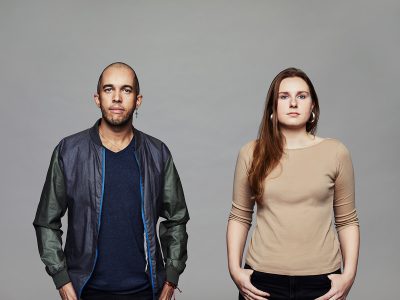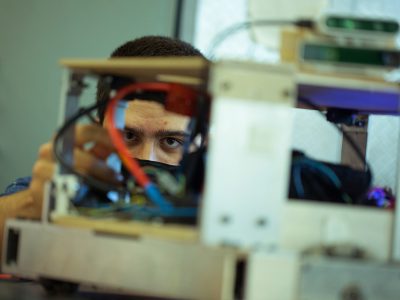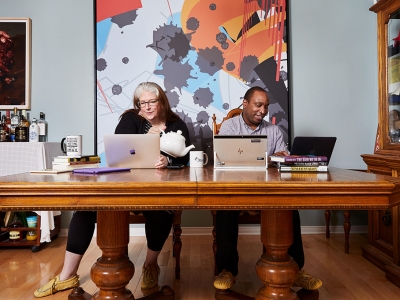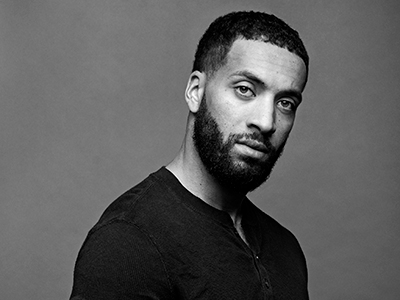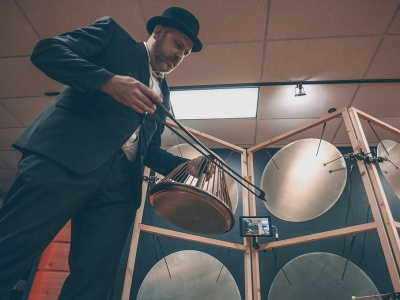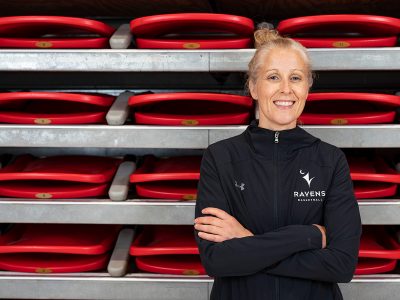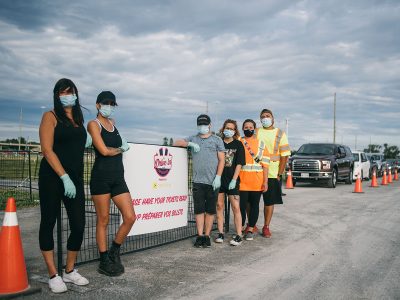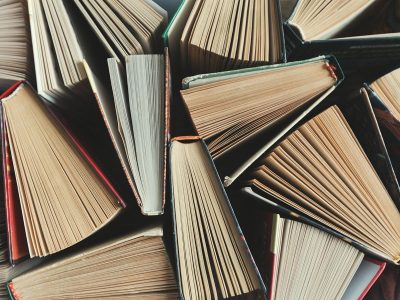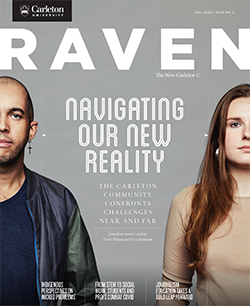 Welcome to the second issue of Raven magazine, a showcase for the important and impactful work of Carleton faculty, students, staff, alumni and the university’s external partners. In this issue, we explore how the Carleton community is responding to the COVID-19 pandemic and other pressing challenges of our era, from laboratory research on coronavirus treatments and front-line service as social workers to addressing wicked problems through Indigenous perspectives and developing innovative approaches to online teaching.
Welcome to the second issue of Raven magazine, a showcase for the important and impactful work of Carleton faculty, students, staff, alumni and the university’s external partners. In this issue, we explore how the Carleton community is responding to the COVID-19 pandemic and other pressing challenges of our era, from laboratory research on coronavirus treatments and front-line service as social workers to addressing wicked problems through Indigenous perspectives and developing innovative approaches to online teaching.
In many of these articles, students, professors and alumni speak directly to you in either first-person or as-told-to format. We want their voices to be front and centre in Raven. They make our university great, and this is their magazine. Click on the magazine cover to see Raven in “flipping book” format or scroll down to read stories via the links below.
Etuaptmumk: Business Professor Rick Colbourne Investigates the Economic Impact of the Pandemic on Indigenous Communities
Before Rick Colbourne put a list of distinguished letters after his name from universities in Canada and abroad, and long before he joined Carleton’s Sprott School of Business as a professor last year, he taught himself guitar, formed a rock band called Hard Poetry and opened for acts like the Barenaked Ladies. “I was always writing and playing music — that’s how I made sense of the world,” says Colbourne, an Anishinaabe from the Mattawa/North Bay Algonquin First Nation, who, around the time his band was touring, worked with low-income and homeless people for a non-profit charity on Vancouver’s Downtown Eastside. “The songs I wrote,” he says, “reflected what I was experiencing and feeling out on the streets.” Yet after releasing albums and playing gigs across the country, Colbourne changed directions…
Leap In: Ten Ways Carleton Students, Faculty, Staff And Alumni Have Stepped Up to the Coronavirus Challenge
Helping the capital’s most vulnerable residents. Pushing for health equity and safe cycling infrastructure. Funding critical scientific and medical research. Protecting wildlife. Breathing life into historic sites. Teaching seniors how to use technology. Getting new tools into hospitals now. Sharing culture. Using data to drive policy change. Empowering Indigenous children and families. The myriad impacts of COVID-19 have demanded a range of responses. Thankfully, the Carleton community is not homogenous, and the ways in which students, faculty, staff and alumni have used their education and experience to address the devastating virus and successive shock waves vary tremendously. In the following package, you’ll read about a group of people whose work show how much is possible when we put our collective energy toward alleviating the biggest public health crisis in a century.
Neighbourhood Watch: Amid a Devastating Health Crisis and Rising Racial Tension, Carleton Researchers Are Evaluating Ottawa’s New Community Policing Project
Ottawa Police Service Constable Vianney Calixte — a community officer who patrols his old stomping grounds, Vanier/Overbrook, in the city’s east end — used to sell insurance for a living. He’s a good talker and people like him, which is why he was a good salesman. It’s also why he’s a good cop. This past summer, the bilingual, Haitian-born, 15-year veteran of the force received several complaints about a homeless guy living in a tent at a busy Vanier intersection. Nearby residents wanted him gone. Calixte went to visit the man and found out that he was a recovering addict and alcoholic trying to avoid inner-city shelters and the people who might suck him back into that life. This is probably not what you expect to hear today when someone mentions policing.
All Together Now: Teaching Trailblazer Melanie Adrian Wants to Make Remote Learning a Social Experience
How much knowledge can students absorb in an online class with all the distractions of home life bubbling in the background? It’s difficult enough in a university setting to compete for their attention with texts, games and news streaming into their devices. Studying from home presents an even greater variety of interruptions (pets, phone calls, pesky siblings) and temptations (pie in the fridge, poker websites, pals next door). University students are expected to take responsibility for their schedules and class work, but the pandemic is not life as normal. So the challenge for Carleton’s professors, who had to swiftly develop online versions of their classes over the past few months, is figuring out how to engage students in course material while we are all coping with isolation, economic uncertainty and the fear of contracting a highly transmissible disease.
This Is Your Brain On COVID: What Happens Inside Our Heads During Troubling Times
Kim Hellemans is a neuroscience professor at Carleton, chair of the department and the winner of multiple awards for teaching and student support. Her research focuses on mental health, stress and addiction. Jim Davies is a cognitive science professor, director of the university’s Science of Imagination Laboratory and the author of two books, most recently Imagination: The Science of Your Mind’s Greatest Power. Together, Hellemans and Davies host an award-winning podcast, “Minding the Brain,” which explores cognitive and brain science, covering subjects such as sleep, climate change psychology and emotional expression. They’ve been recording it from separate locations for a few months, so we interviewed them individually and stitched together their conversation.
